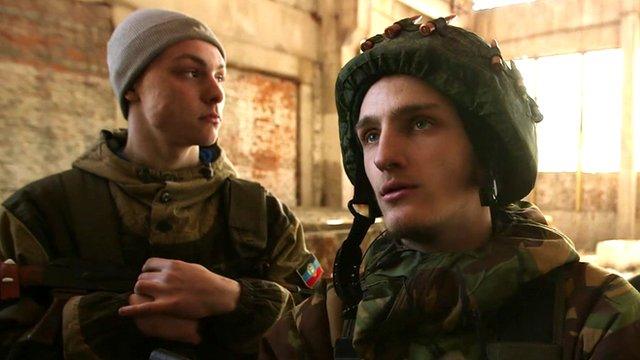Ukraine conflict: Marathon in Minsk
- Published
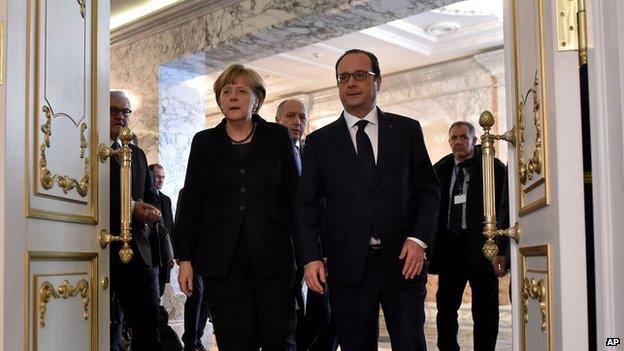
Fractures between the negotiating parties' positions were reflected in the body language on display
There's something about Minsk's opulent Palace of Independence. Even in the dark of night, its shimmering chandeliers and opaque windows can trick you into thinking it's still broad daylight.
Little escapes the bright glare of this cavernous complex.
And much that mattered this week about Ukraine's crisis summitry behind its gilded doors did not escape the eyes of the world.
It didn't go unnoticed that when the Presidents of Ukraine and Russia first came face to face, they couldn't bear to look each other in the eye when forced to shake hands. Cameras caught Moscow's man immediately wiping his hands together as if to symbolically cleanse himself of this fleeting contact.
Another snapshot showed four leaders tasked with ending the carnage in eastern Ukraine sitting around a small table, all glumly looking past each other, all staring in different directions. Twists of foil-wrapped chocolates on delicate plates seemed to be the only bright spot in the room, aside from the blazing lights of the palace itself.
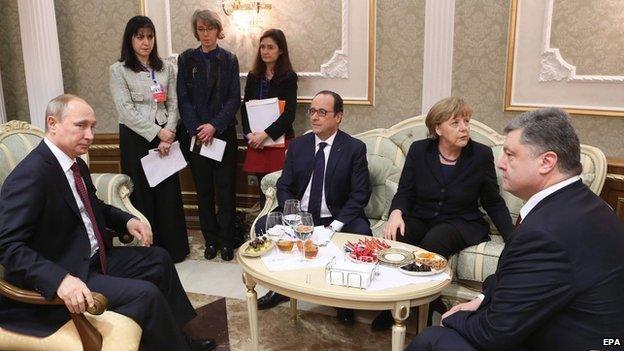
Discussions in Minsk took place in a palpably tense atmosphere
A photographer immortalised the moment when they emerged, and naturally fell into geopolitical line - a tight German French Ukrainian knot was followed, several paces behind, by a cosy Russian and Belarusian pair.
"It wasn't the best night of my life," Mr Putin quipped when his longest ever negotiations came to end, nearly 17 hours later. The image that went viral was an innocuous little green pencil a grim-faced Russian president had snapped in two - a fitting symbol of fraying nerves and negotiations that came perilously close to collapse.
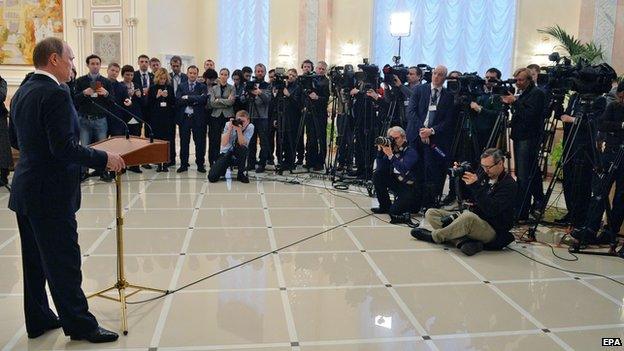
Protracted negotiations continued long into a night President Putin described as "not the best of my life"
There were no choreographed handshakes to seal the deal to send a reassuring signal to the world that "one of the last chances" to bring peace to eastern Ukraine had ended well. But three separate press conferences revealed what had been agreed, and laid bare what still had to be done.
'Flickering glimmer'
An exhausted German Chancellor, flanked by her loyal French ally, told a bleary-eyed press pack there was now a "glimmer of light".
But it was just that, a flickering glimmer.
"We have no illusions," admitted the dark-suited and ashen-faced Angela Merkel who had flown to Minsk after talks on the other side of the world with President Barack Obama. "A great, great deal of work still needs to be done. But there is a real chance to turn things around toward the better."
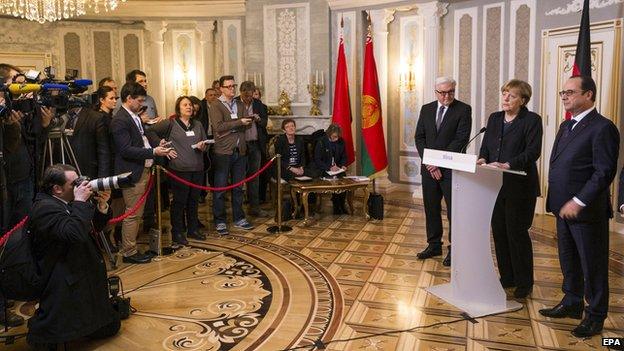
Chancellor Merkel is under no illusions about the scale of the task still at hand
The pause button was pressed in the worst East-West crisis since the Cold War. It put on hold Washington's warning that it may arm Ukrainian forces struggling to hold ground against better equipped pro-Russian separatists. And it postponed any plans by Ukraine's President Petro Poroshenko to impose what he vaguely called martial law.
The big picture sounds promising: a ceasefire would come into effect at 00:00 on Sunday; heavy weaponry would be withdrawn from front lines and prisoners freed; and a commitment to constitutional change would give greater autonomy to eastern Ukraine.
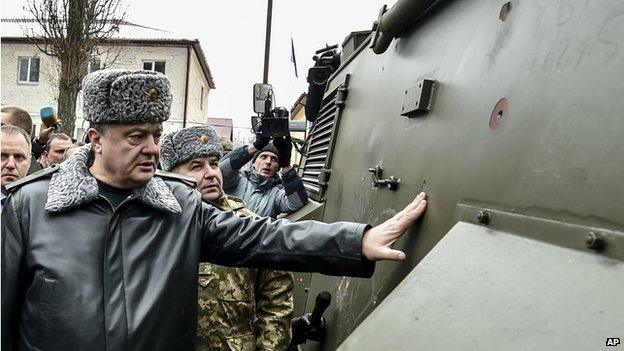
Pro-Russian separatist forces are better equipped than the Kiev government they are fighting in the east of the country
But as hard as it was to reach an agreement, harder still will be making it stick.
Its neatly phased sequencing sits in stark contrast to a messy, bloody war on the ground, where warring sides are still fighting for territorial advantage.
There is likely to be a weekend of fighting before the ceasefire is meant to kick in. Then there's a long two weeks until heavy weapons, including artillery and rocket launchers, are to be pulled back. The new buffer zone is much wider than the one agreed in the first Minsk deal. That deal was reached, and quickly broken, last September.
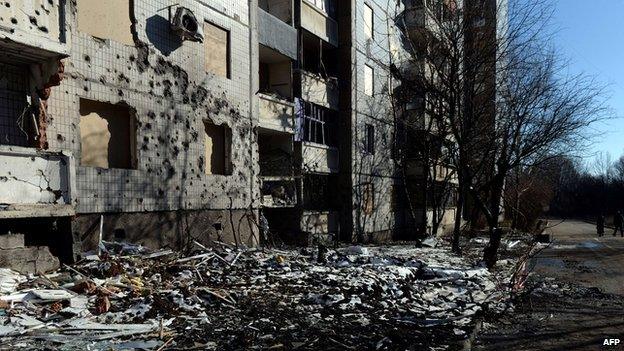
Fighting has taken a heavy toll on life in cities in the east of Ukraine such as Donetsk
The expanse separating Ukrainian government forces and Russian-backed separatists has been extended from some 15 km (nine miles), to 50 km for heavy artillery and up to 140 km for rockets.
Since September, the rebel forces have made significant advances, capturing some 500 sq km (190 sq miles). As leaders argued over a demarcation line, intense fighting continued around the strategic hub of Debaltseve, and no clarity was reached on its status.
And the central political question was also left hanging. The core issue of Ukraine's territorial integrity, and the future of rebel held areas, including self-declared "People's Republics" around the cities of Donetsk and Luhansk, is still unresolved.
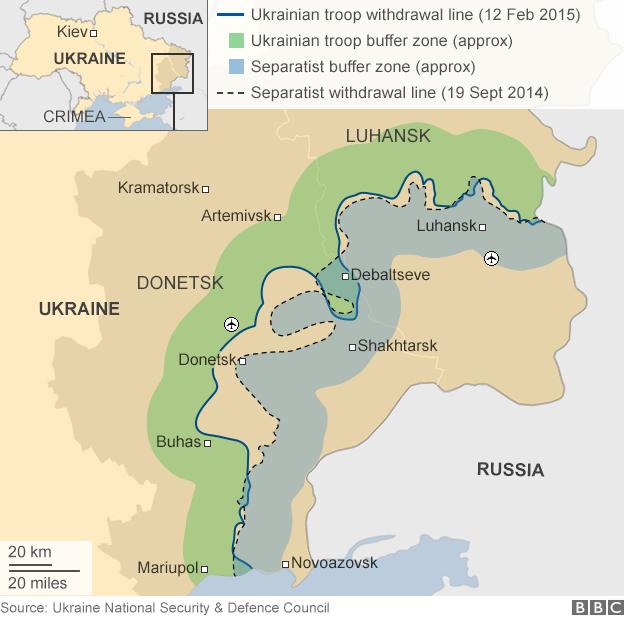
Ukraine's long, porous border with Russia, where Moscow is accused of sending in men and materiel, will only be sealed by the end of next year, and only if some contentious political issues are resolved.
The parliament in Kiev is expected to approve constitutional changes to cede significant powers to the eastern regions. Neither the parliament nor the rebels will easily agree on the terms of what Mr Putin called "a political settlement".
Ukraine's President Poroshenko was adamant - there was no agreement on federalisation. His word was the less loaded, less powerful "decentralisation".
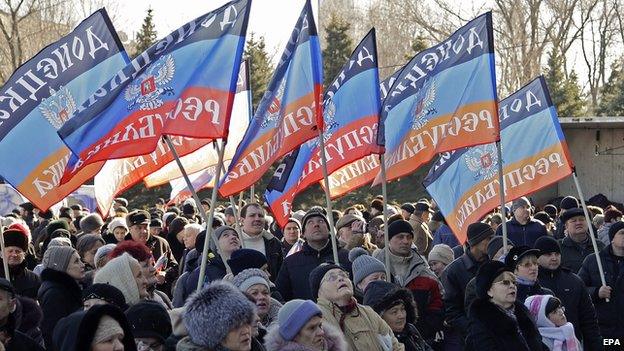
The flag of the self-declared People's Republic of Donetsk is still flown defiantly in the city
Ukraine and its western allies fear that, as time drags on, a "frozen conflict" risks turning rebel-held regions into de facto states.
Seventeen hours was not long enough to spell out exactly what every line means in a 13-point deal.
The new accord calls for disarming "illegal groups". But separatist fighters aren't likely to think that refers to them.
Volunteers
There's also a commitment that "all foreign troops" must be withdrawn. For Kiev, that means Russian forces, but Moscow denies they're even there, referring to them as volunteers.
But there seem to have been some signs of statesmanship during the long night. Chancellor Merkel thanked President Poroshenko for doing "everything to achieve the possibility of an end to the bloodshed". And she noted that, in the end, President Putin put pressure on separatist leaders, also in Minsk, when talks threatened to collapse.
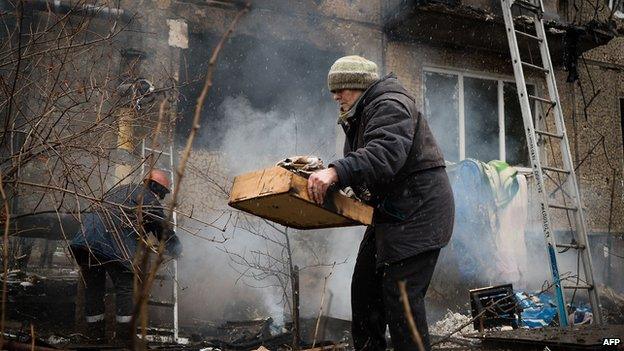
Heavy shelling has left residents of Donetsk attempting to pick up the pieces
A complex web of compromises will be tested in the days and weeks to come. Even bigger issues, like Ukraine's relationship with Nato, loom in the margins of a more immediate crisis.
As leaders prepared to leave the glittering Palace of Independence, President Hollande spoke of "relief for Europe". No doubt they all breathed sighs of relief that their Minsk marathon was over.
And no sooner were they out the heavily fortified doors into a grey winter's day, the lights of the Palace were shut off, plunging it into darkness.
- Published12 February 2015
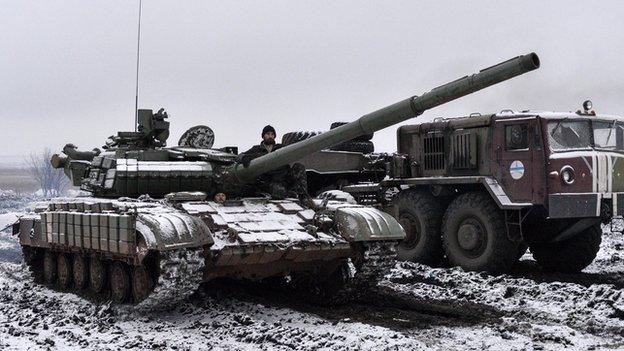
- Published13 February 2015
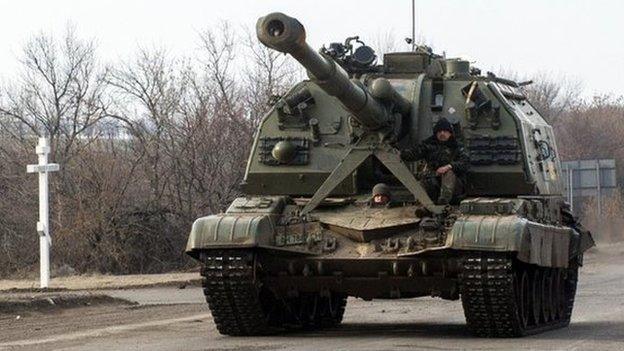
- Published13 February 2015
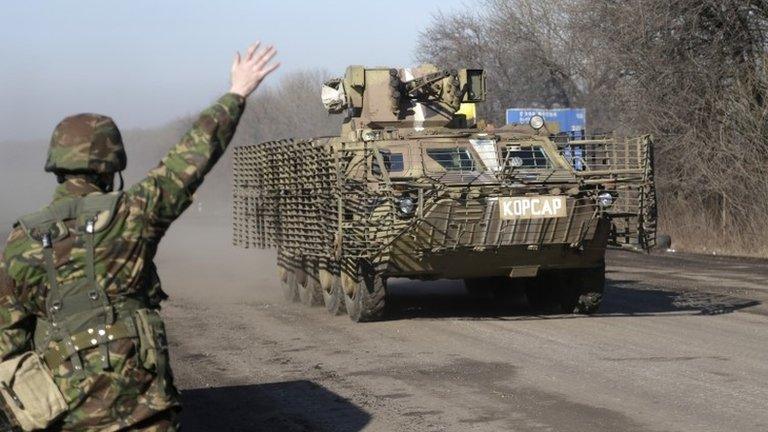
- Published11 February 2015
- Published12 February 2015
